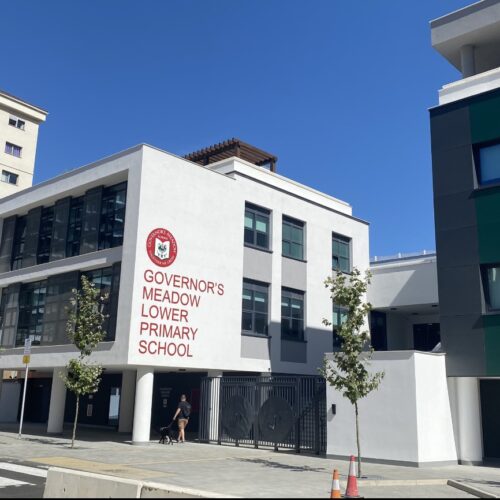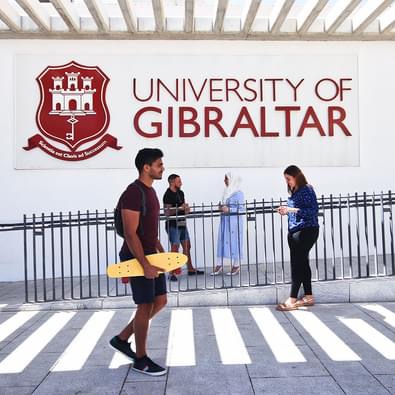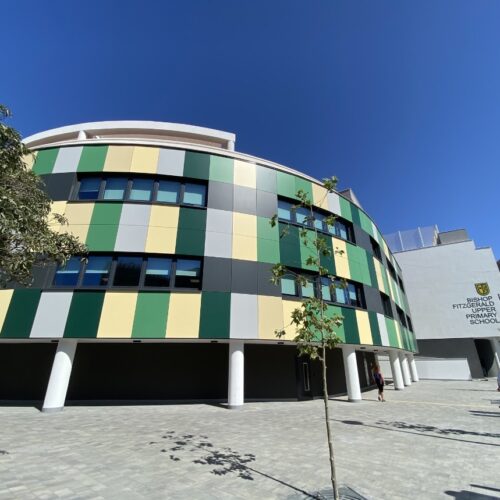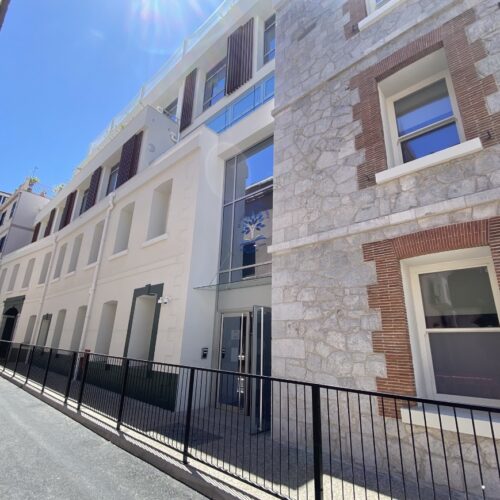Making a healthy start
Research shows a strong connection between healthy behaviours and academic achievement (e.g. grades, standardised tests, attendance). Healthy children and young people are better learners, and academic achievement has a lifetime of benefits for health (National Centre for Chronic Disease Prevention and Health Promotion, 2022).
Steps to ensuring a healthy start to school include :
- Limiting non-educational screen time and encouraging participation in other healthy activities.
- Ensuring your child follows good sleep hygiene and adequate sleep hours for their age. Preschool (3-5 years) recommended 10-13 hours of sleep (including naps). School age (6-12 years) recommended 9-12 hours per 24 hours. Teenagers (13-18 years) recommended 8-10 hours per 24 hours.
- Following a balanced diet including adequate hydration.
- Ensuring your child is up to date with immunisations.
This section will be developed and expanded upon in due course, when the IT systems are developed to include percentage of childhood vaccination uptake.
Education in Gibraltar
Our schools prioritise the creation of nurturing, safe, engaging, and stimulating learning environments that offer pupils rich opportunities for personalised learning. This is achieved through a broad and balanced skills-based curriculum which focuses on the holistic development of children and young people. Department of Education staff are committed to equipping our community’s children with the necessary skills, knowledge, and understanding to empower them as active citizens in both our local community and the wider world. The aim is to provide them with the tools to navigate not only the challenges of today but also those of the future.
Our schools are dedicated to fostering the development of kind, resourceful, empathic and confident children and young people. The primary goal is to equip learners with essential skills such as problem-solving, critical thinking, and collaboration. By nurturing these competences, we aim to empower our learners to navigate challenges with resilience and adaptability. The Department of Education’s commitment lies in shaping individuals who thrive as compassionate and capable contributors to society. It is the Department of Education’s belief that if this is achieved, children and young people will be given the opportunity to succeed emotionally, socially and academically.
Educational qualifications are a determinant of an individual’s labour market position, which in turn influences income, housing and other material resources which are closely related to health outcomes and health inequalities. The Gibraltar Government has high ambitions for all children and young people to have the best start in life, including those with special educational needs and disabilities (SEND). Children and young people, including those with complex needs require access to good local provision and opportunities to achieve their full potential.
There are a total of 15 Government mainstream Schools in Gibraltar including :
Lower Primary
- St. Bernard’s Lower Primary
- Governor’s Meadow Lower Primary
- Hebrew Lower Primary
- St. Joseph’s Lower Primary
- St. Mary’s Lower Primary
- Notre Dame Lower Primary
- St. Paul’s Lower Primary
Upper Primary
- St. Anne’s Upper Primary
- St. Bernard’s Upper Primary
- Bishop Fitzgerald Upper Primary
- Hebrew Upper Primary
- St. Joseph’s Upper Primary
Secondary
- Bayside
- Westside
- Gibraltar College
Total number of pupils in education in Gibraltar
As of September 2023, there were a total of 6,262 pupils enrolled across all HMGoG schools. A total of 320 pupils were enrolled at Loreto Convent school and 248 pupils were enrolled at Prior Park school as of September 2023.
Figure 1: Number of pupils enrolled in HMGoG schools as of September 2023.
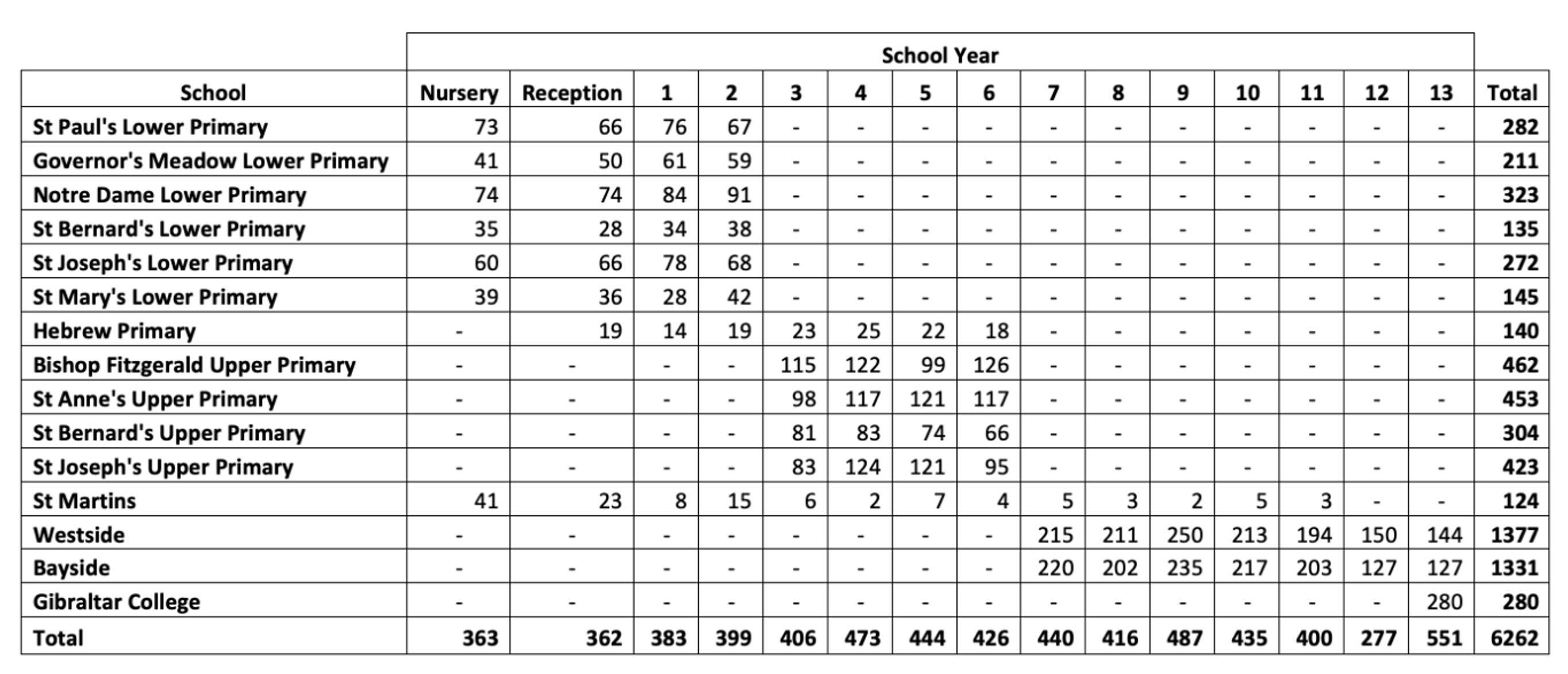
Figure 2:
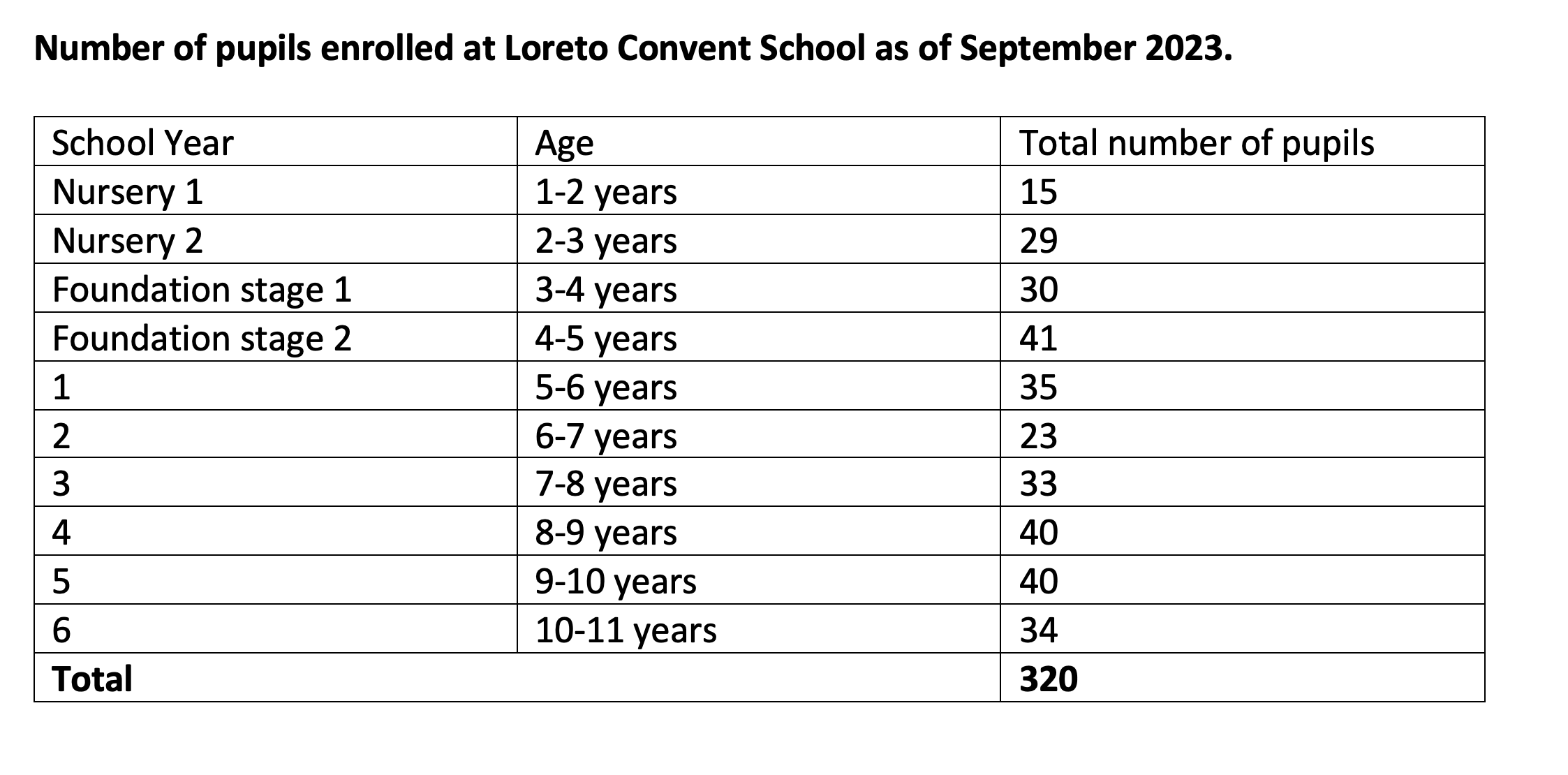
Figure 3:
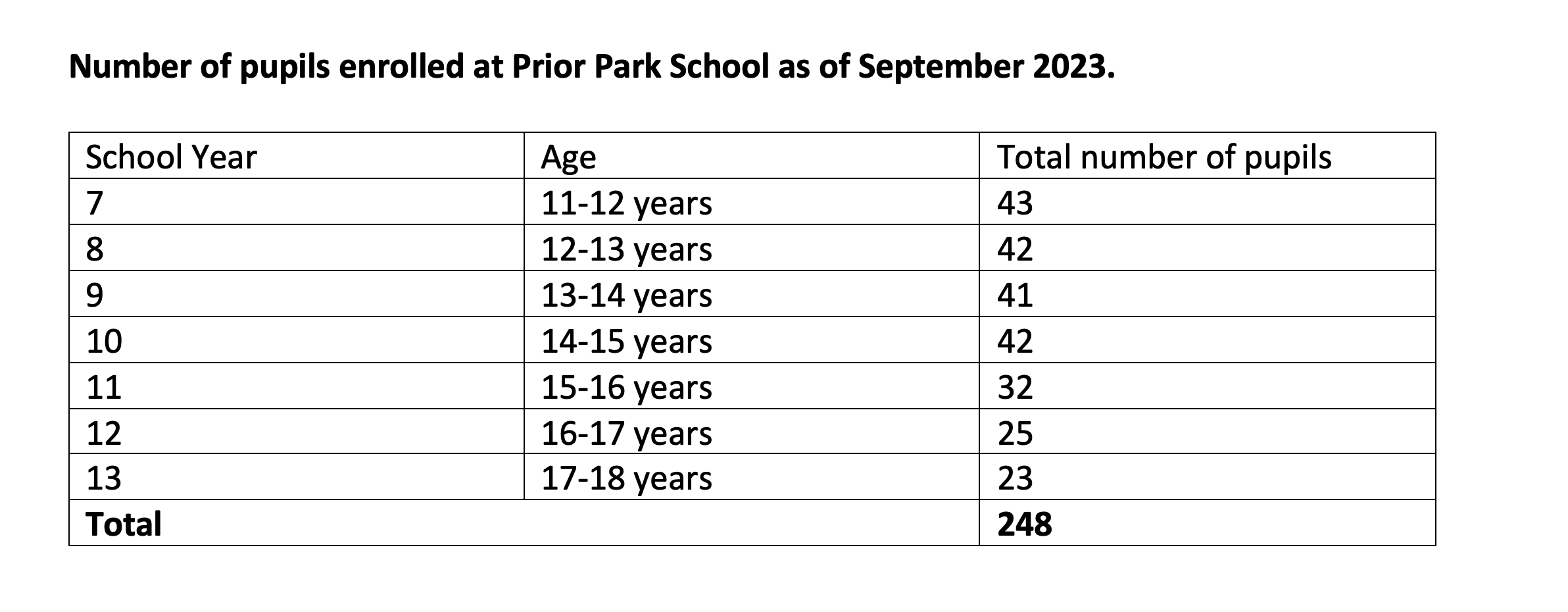
Educational Attainment
Students in Gibraltar consistently achieve overall pass rates of over 90% at A-level. It is important to note due to the COVID-19 pandemic in 2021 traditional summer examinations were cancelled and students were awarded teacher assessed grades. In 2023 the overall pass rate at a level throughout the 3 institutions (Westside, Bayside, Gibraltar College) was 93%. This is comparable with this year’s UK A-level results, where 97.3% of A level entries in the UK passed.
Figure 4: Student attainment at A-level in Gibraltar
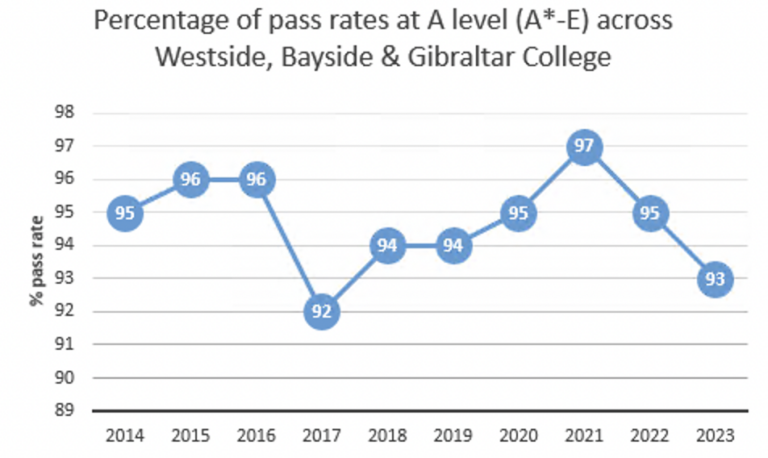
In 2023, 99% of Westside students achieved pass grades at A-level, compared to 93% of students in Bayside school and 87% of students at the Gibraltar College.
Figure 5: Student attainment at A-level – breakdown across institutions
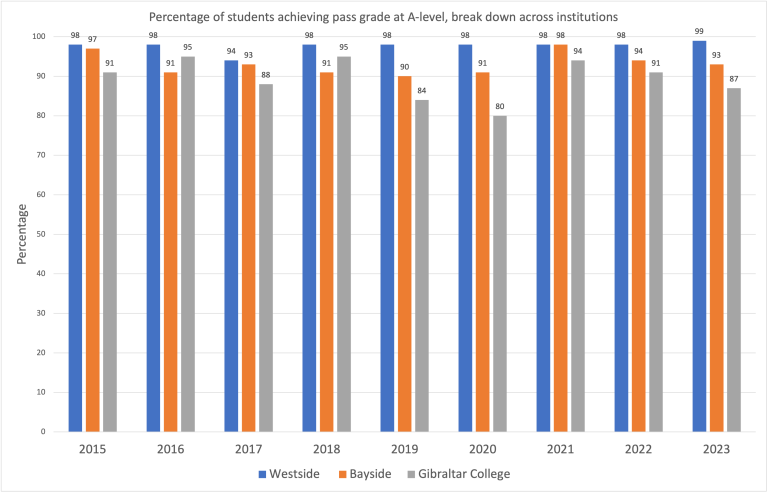
Special Educational Needs
The Department of Education has observed that Gibraltar is experiencing an increase in the number of children with special educational needs. Under the Gibraltar Education and Training 1974 Regulations, a child is defined as having “special needs” if they have a learning difficulty which calls for special educational provision to be made for them. Under the regulations, a learning difficulty is defined as having:
(a) a significantly greater difficulty in learning than the majority of children of their age; or
(b) a disability which either prevents or hinders them from making use of educational facilities of a kind generally provided for children of their age in government schools.
The special educational needs definition for Gibraltar therefore includes children with learning difficulties and/or physical or intellectual disabilities. The Gibraltar Disability Act 2017 defines disability as, “a physical or mental impairment which has a substantial and long-term adverse effect on a person’s ability to carry out day-to-day activities”.
Figure 6 : Prevalence of SEN over time among pupils in Government-run nurseries and schools
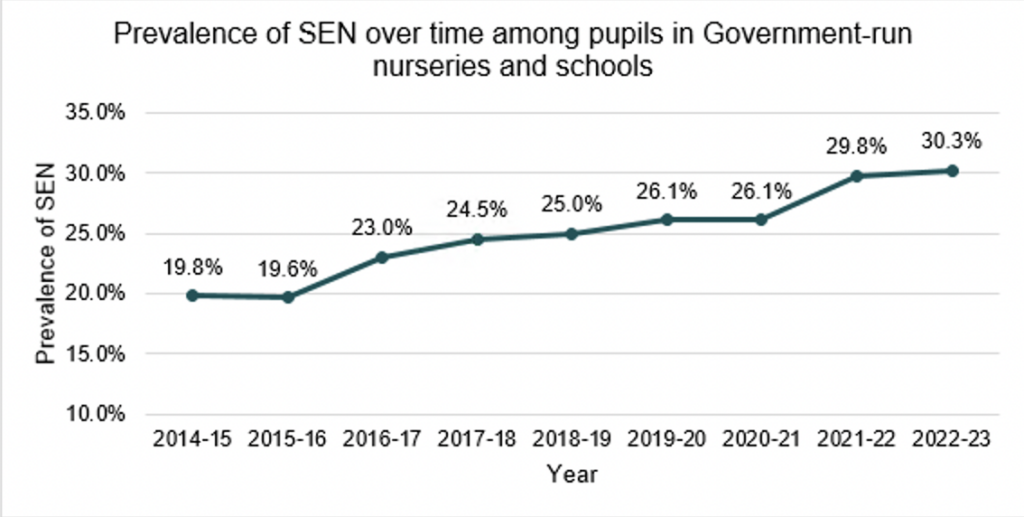
In 2022/23, the prevalence of special educational needs (SEN) in government-run nurseries and schools in Gibraltar was 30.3% (using the total number of enrolled pupils as the denominator). Figure 3 shows a consistent upward trajectory in prevalence since 2014/15, when prevalence was 19.8%.
Figure 7: Number of pupils by type of need over time.

As shown in figure 4, consistently overtime, the three most common types of special educational needs among children in Gibraltar are,
- General learning difficulties,
- Behavioural, emotional and social development needs,
- Speech and language difficulties.
Figure 8: Type of need as a proportion of all recorded needs in 2021/22 among pupils in government schools.
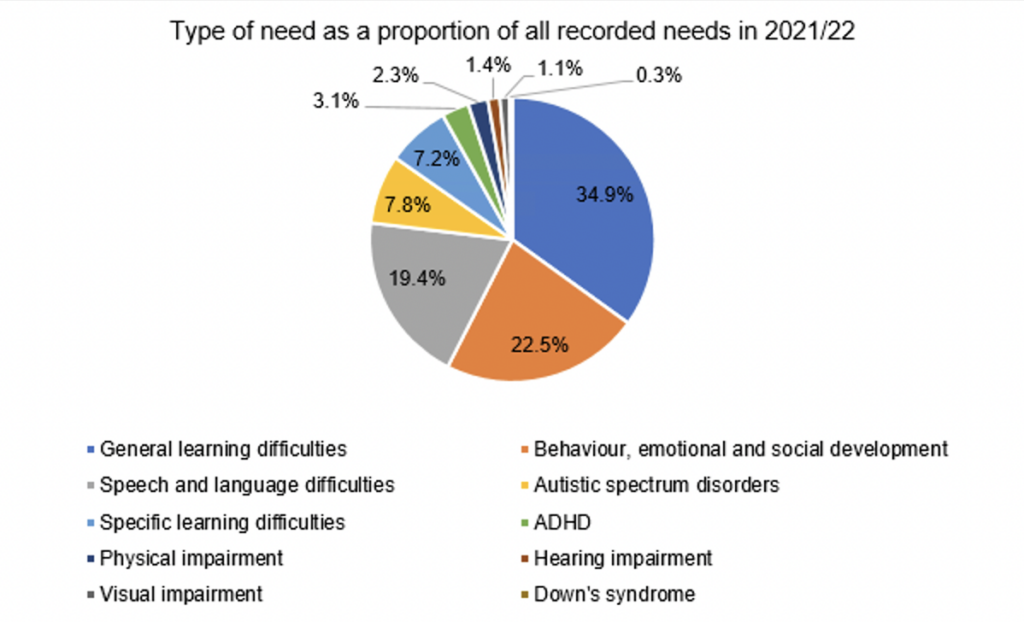
In 2021/22, as shown in figure 5, general learning difficulties made up about 35% of all recorded special education needs, behavioural emotional and social development needs made up approximately 23%, and speech and language difficulties around 19%.
Figure 9: Percentage growth in number of pupils by type of need between 2012/13 and 2021/22.
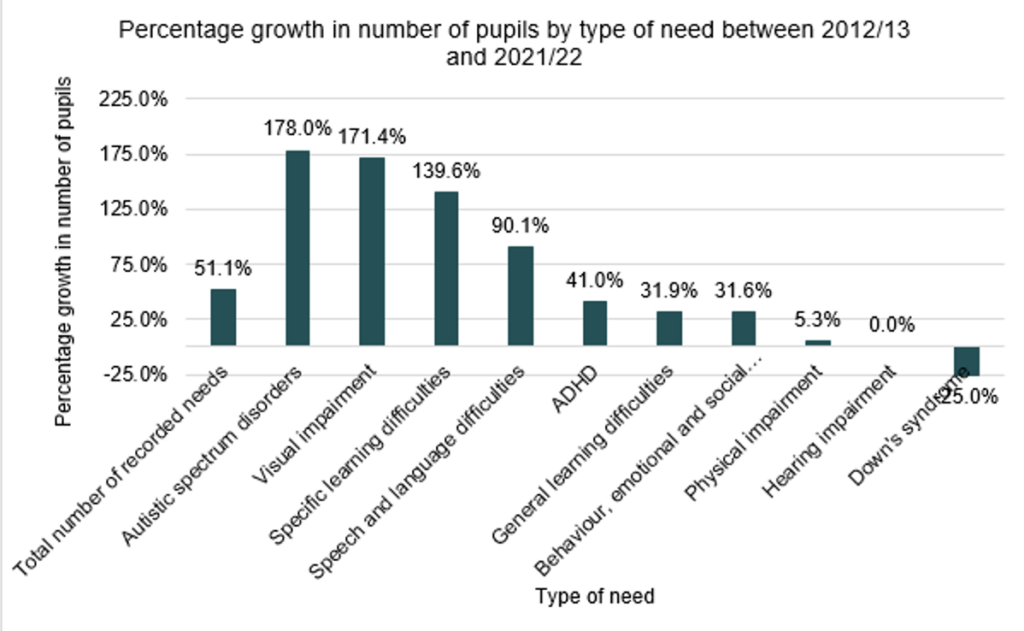
Figure 6 below shows that the fastest growing types of need (in terms of percentage growth in the number of pupils recorded as having that need) between 2012/13 and 2021/22 were autistic spectrum disorders, visual impairment, specific learning difficulties and speech and language difficulties.
Gibraltar Health Authority (GHA) orthoptists have discussed the data on visual impairments in relation to the increase in numbers in the Government Statistics education data. They have not noticed any increase in the number of children diagnosed with visual impairment, and concluded that it is likely that teachers are including children in this category who do not meet the medical definition of visual impairment, and that the criteria being used to define children as having a visual impairment are likely to vary across teachers and schools.
Special Education Schools
In Gibraltar we have 1 special education school called St. Martin’s School. The early years and pre-school provision within St. Martin’s is provided through Early Birds Nursery, which is co-located within the school and caters for children aged 2 to 4 years.
However, there are currently Learning Support Facilities established at mainstream schools including :
- Governors Meadow Lower Primary
- Notre Dame Lower Primary
- Bishop Fitzgerald Upper Primary,
- St Anne’s Upper Primary,
- Bayside,
- Westside,
Recently opened LSFs (Sep 2023):
- St Joseph’s Lower Primary,
- St Mary’s Lower Primary,
- St Paul’s Lower Primary.
(These are being phased in and currently only have a Nursery and Reception intake).
There are now Learning Support Nurseries in:
- Governor’s Meadow Lower Primary,
- Notre Dame Lower Primary,
- St Joseph’s Lower Primary,
- St Mary’s Lower Primary,
- St Paul’s Lower Primary.
Learning Support Facilities provide children and young people with additional tiers of learning support to that offered within a mainstream classroom setting. Children and young people who attend HMGoG LSFs in mainstream schools are involved in all the aspects of school life that they can access, with additional bespoke support being provided within the LSF setting, in accordance with each individual’s personalised needs. LSFs are staffed with LSF teachers and Special Needs Learning Support Assistants (SNLSAs), with the level of support and the resources allocated to each setting being determined through the inter-agency Special Educational Needs Assessment Panel. Support is needs-driven and is always focused on developing children’s skills so that they can become increasingly independent learners. The adult:pupil ratio within LSFs is typically significantly higher than within mainstream classes, and is always determined in response to identified pupil needs.
Early Bird’s Nursery and St. Martin’s School have seen an increase in the number of students on roll in recent years. Between the years of 2019-2023 a greater increase in the number of students on roll can be observed compared to previous years.
Figure 10: St. Martin’s School Pupils on Roll from 2009-2023.
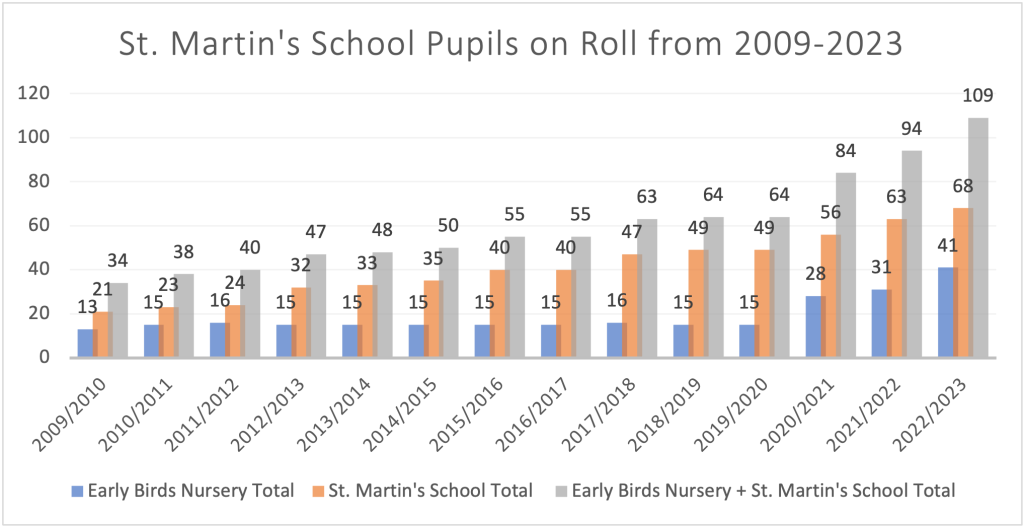
Figure 11: Projections for number of pupils leaving St. Martin’s School year on year from 2021-2022 onwards.
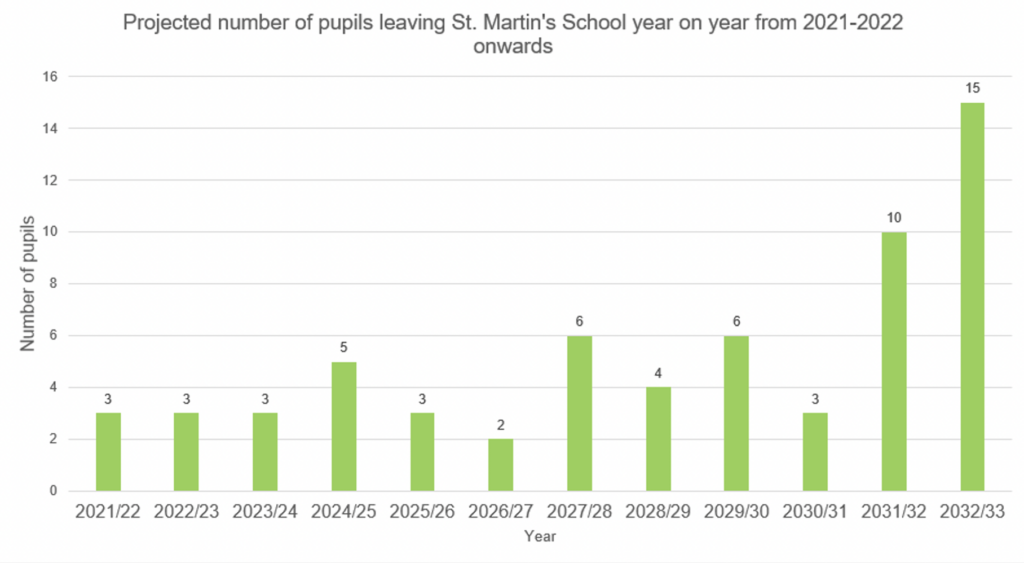
It is important to highlight that the numbers in figure 8 are based on the current student population in the distinct chronological year groups, and that the numbers in the latter couple of year groups on the graph refer to the youngest cohorts currently in school. As a result, these numbers maybe artificially inflated due to the larger school cohort in the early years. Through successful early intervention, a number of the children currently attending EBN and St. Martin’s will transition into LSF or a mainstream setting.
Understanding patterns in pupil projections is a key aspect of the JSNA. This allows for future planning and helps identify potential areas of need.
Increasing numbers of pupils at Early Bird’s Nursery will require changes to be made once these cohorts of children transition to higher levels of education. This could have impacts on numbers of SEN teachers, class sizes and resources.
Once children transition out of St. Martin’s School, they may need to move into a supported environment to continue learning or an alternative training pathway. Many of these children will continue on at St. Bernadette’s at aged 16, and some of these young people will access relevant courses at the Gibraltar College.
Identifying future increases in numbers of children with Special Educational Needs at the present time is important. Forward planning allows relevant stakeholders and planners to be equipped to provide care for adults with SEND and complex needs in the future. This could include:
- Increasing and improving access to support for independent living.
- Greater investment into specialist mental health training.
- Inclusive educational programmes for infants, children and adults.
- Workforce development and the need to raise awareness in the general public.
Investments into Education
The Gibraltar Government has committed to continuing to develop and improve access to education.
- The Gibraltar Government has recently invested in the refurbishment of three new schools which opened at the academic year 2023/2024. This includes the completion and opening of St. Mary’s Lower Primary School, Governor’s Meadow Lower Primary School and Bishop Fitzgerald Upper Primary School.
- The Gibraltar University was inaugurated in September 2015 and has developed throughout the years as the number of courses on offer expand and student cohort increases.
- The Gibraltar Government continues to offer Discretionary and Mandatory Grants to eligible students to fund further studies. In addition to this, maintenance grants will increase by 15% from the next academic year to assist with the cost of living increase in the UK over the last two years.
- Following a comprehensive review of pupil’s mental health and emotional wellbeing conducted by the Department of Education, a website has been designed to support Gibraltar students on their journey into higher education. This website is targeted at students moving away from Gibraltar who may experience anxieties about moving to a new location.
Useful resources
Page last reviewed : December 2023

